Herbal healers VI
Herbal healers VI
Kanchanara
Scientific name : Bauhinia variegata,
Family : Caesalpiniaceae
Vernacular name
- Assamese : Kancan, Kanchan
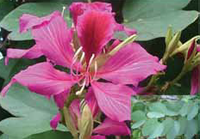
- Bengali : Kanchana, Rakta Kanchana
- English : Mountain Ebony
- Gujrati : Champakati, Kanchnar, Kachnar
- Hindi : Kachanar, Kanchanar, Kachnar
- Kannada : Keyumandar, Kanchavala
- Kashmiri : Kalad
- Malayalam : Chuvanna Mandharam
- Marathi : Kanchana, Raktakancana
- Oriya : Kachana, Kaniara
- Punjabi : Kanchnar
- Tamil : Sigappu mandarai, Sihappu mantarai
- Telugu : Deva Kanchanam
Medicinal Uses
- Mouth Ulcers: 20 gms of Kanchanara bark powder boiled in 200 ml of water till it reduced to 50 ml . Use this decoction for gargle 2-3 times a day is extremely effective cure for mouth ulcers
- Diarrhea: Internal administration of 3 gms of kanchanara bark powder along with warm water twice daily is useful to control diarrhea.
- Hepatomegaly: consumption of 10-20ml of leaves juice 2 times a day will increases the liver function as well as decreases enlargement of the liver.
- Tonsilites: 10 grams of kachanara bark boiled in 100 ml of water until it reduces to 25 ml. Strain and drink twice daily
- Cysts & Fibroids in Uterus: 20 grams of fresh bark of kanchanara is boiled in 200 ml of water until the water is decreased to 50 ml. Strain and drink. This is useful in curing cysts and fibroid uterus.
- Burning Sensation In Urine: 10 gms of bark, 3gms of cumin seed, 3gms of coriander seeds are boiled in 100 ml of water till it reduced to 50 ml. Administration of this decoction by adding some jaggary twice daily is beneficial in burning micturition.
Karanja
Scientific name : Pongamia pinnata
Family : Fabaceae
Vernacular name
- Assamese : Korach
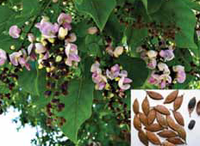
- Bengali : Nata Karanja, Dahara Karanja
- English : Smooth leaved pongamia
- Gujrati : Kanajo, Karanji
- Hindi : Dithouri, Karuaini
- Kannada : Honge, Hulagilu
- Kashmiri : Kath
- Malayalam : Avittal, Ungu, Unu, Pungu
- Marathi : Karanja
- Oriya : Karnja
- Punjabi : Karanj
- Tamil : Pungan, Pongana
- Telugu : Lamiga, Kanuga
- Urdu : Karanj
Medicinal Uses
- Wounds: 20-30 gram of karanja bark is boiled with 200ml of water and reduced it in to ¼. This decoction is used to wash the chronic ulcers and wounds. For sitz bath also it is useful, especially after the anorectal surgeries and kshara therapies.
- Insect and wasp bite : The fresh leaf juice is applied over the lesions of wasp bite or insect bite frequently .This reduces the swelling and pain instantly.
- Eczema: Equal quantity of fresh rhizomes of turmeric and pongamia seeds paste is applied externally to tred the eczema and scabies etc.
- Conjunctivitis: 20 young leaves of karanja should be soaked in hot water over night. Next day morning macerate the leaves and filter it, to obtain cold infusion. This is used to wash the eyes. This relieves pain, discoloration and gritty feeling caused during the conjunctivitis.
- Piles: Karanja bark 3 gms and Triphala powder 3gms are boiled in 200ml of water and reduced it into 1/4th ,to made decoction. It is administered internally (in the dose of 25 ml twice a day) and externally (for sitz bath ) in case of post operative care of ano-rectal alkaline therapies (Kshara therapy).
- Boils: Equal quantity of Karanja seeds, sesamum seeds, mustard seeds, dugdhika plant, castor seeds are made into fine paste and applied over the boils is beneficial.
Karavellaka
Scientific name :Momordica charantia
Family : Cucurbitaceae
Vernacular name
- Assamese : Kakiral, Kakral
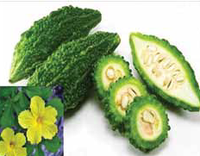
- Bengali : Karolla
- English : Bitter gourd
- Gujrati : Karela
- Hindi : Karela
- Kannada : Hagalakai
- Malayalam : Kaippa, Pavackkai
- Marathi : Karla
- Oriya : Kalara, Salara
- Punjabi : Karela
- Tamil : Paharkai
- Telugu : Kaakara Kaaya
- Urdu : Karela
Medicinal Uses
- Lactation : Prepare the paste of bitter gourd (karela) leaves and apply it over the breasts overnight, or, if possible, throughout the day. Use fresh leaves every day. It Promotes the location.
- Diabetes: Research has proved that karela contains insulin like properties and thus is called plant-insulin, which is highly beneficial in lowering the sugar levels. Drink one cup of fresh karela juice (3 ‒ 4 karelas) daily in the morning.
- Wound: Externed application of the paste prepared from the leaves of karela and dhattura (Datura metel) paste external applied over the wounds, promotes in fast healing.
- Intestinal worms: The fresh juice of the fruit is given in a dose of 20ml early morning on empty stomach for 3-5 days to treat intestinal worms.
- Blood purifier: The juice of the fruit is consumed daily in a dose of 20-25ml to detox the blood and acts as blood purifier.
- Prolapse of Uterus: The uterus prolapsed is restored to its normal position by application of Karavellaka root paste followed by press up prolapse to its position and give T bandage.
Karpura
Scientific name :Cinnamomum camphora,
Family : Lauraceae
Vernacular name
- Assamese : Karpura
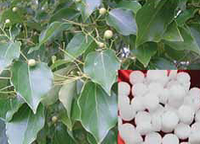
- Bengali : Karpur
- English : Camphor
- Gujarati : Kapur
- Hindi : Kapur
- Kannada : Karpur
- Malayalam : Karpuram, Chutakkapuram
- Marati : Kaapur
- Oriya : Karpur
- Punjabi : Kapura
- Tamil : Karpuram
- Telugu : Karpram, Karpuraamu
- Urdu : Riyaahi Kapphur, Kaaphoraa
Medicinal Uses
- Mosquito repellent: Soaking a bit of cloth within camphor oil as well as leaving it in the corners of the house. It helps drive away mosquitoes as well as flies.
- Skin Itching: Camphor oil application is good for skin and also removes skin itching, rashes and also inflammation.
- Joint Pains: Warm sesame oil with camphor and massaging the body with this oil just before a Hot water bath will give relief to the aching body. Camphor is actually a rubefacient as well as energizes the dilation of capillaries.
- Fungal nail: Camphorated oil may be used locally to cure fungus-infected toe nails.
- Burn scars: Water mixed with a bit of camphor should be applied regularly on burn scars till it disappears.
- Head lice: 10grams of camphor is dissolved in 100 ml of warm coconut oil and allowed to cool. This is applied on the scalp at night. Next day morning wash the hair. It is helpful in destroying the head lice.
- Chest congestion: 5grams of camphor added in 100 ml of warm sesame oil and dissolved. This is applied over the chest followed by hot water fomentation over the chest to relieve the congestion in chest.
Katuka
Scientific name :Picrorhiza kurroa
Family : scrophulariaceae
Vernacular name
- Assamese : Katki, Kutki
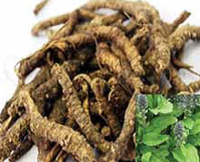
- Bengali : Katki, Kutki, Kuru
- English : Hellebore
- Gujrati : Kadu, Katu
- Hindi : Kutki
- Kannada : Katuka rohini, katuka rohini
- Malayalam : Kaduk rohini, Katuka rohini
- Marathi : Kutki, Kalikutki
- Oriya : Katuki
- Punjabi : Karru, kaur
- Tamil : Katuka rohini, Katuku rohini, Kadugurohini
- Telugu : Karukarohini
- Urdu : Kutki
Medicinal Uses
- Fatty liver : 2- 3gms of Katuki root powder with warm water taken orally twice a day for 3 months to reversal of fatty changes in the liver.
- Upper respiratory tract infections: 1gm of katuki root powder is mixed with honey and licked 4-5 times a day. This pacifies URTI very effectively in children including productive cough.
- Fever: 2 gms of katuki powder boiled in 100ml of water till it reduced to 1/4th. This decoction is beneficial in fever, eosinophilia and cold. Honey or jaggery can be used as adjuvants.
- High Cholesterol: Equal quantity of Katuki and Haridra powders are mixed well and taking orally 3gms with warm water twice daily is found to be effective in treating hyperlipidemia.
- Gastritis: 2gms of katuki powder mixed with sugar taken internally after food twice daily is beneficial in acid peptic disorders as it decreases inflammation and potentially heal the ulcer.
- Hepatites: The paste prepared from katuki and bhumya malaki should be administed 3 gsm twice daily with butter milk is beneficial to cure hepatites.
Kharjura
Scientific name :Phoenix dactylifera,
Family : Arecaceae
Vernacular name
- Assamese : Tamar
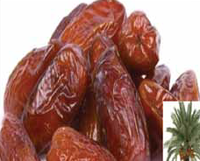
- Bengali : Sohara
- English : Dried Dates
- Gujrati : Kharek, Kharika
- Hindi : Chuhara, Chohara
- Kannada : Karinchula, Khajura
- Malayalam : Intappazham, Inthappana
- Marathi : Kharika, Kharik Phala, Khajur, Kharik
- Oriya : Kharjjuri, Khajur
- Punjabi : Khajur
- Tamil : Pericham, Karchuram, Perichehantay
- Telugu : Kharjura, Kharjuramu
- Urdu : Khurma (Khajoor)
Medicinal Uses
- Constipation: Intake of 5-6 fresh dates mixed with 1 teaspoonful of ghee and a pinch of pepper powder on empty stomach in the morning followed by one glass of warm water. relieves constipation and strengthen the digestive system.
- Erectile dysfunction: Chop 7 fresh dates mix with 3 teaspoons of ghee add a pinch of dry ginger powder, cardamom powder and few stands of saffron , consume it in early morning. This is an effective remedy in Erectile dysfunction.
- As Rejuvenation: A drink in which milk is processed with Dates(Dates milk shake) acts as a rejuvinator.
- Acidity: Soak a few dates overnight in water and eat them in the morning regularly along with the water in which they were soaked.
- Weight gain: Intake of 10-15 dates per day followed by glass of milk daily is useful to increase body bulk.
- Irritable bowel syndrome: 50ml fermented Juice of Grapes, Sugarcane and Dates twice daily is beneficial.
Khaskhasa
Scientific name :Papaver somniferum
Family : Papaveraceae
Vernacular name
- Bengali : Aaphim, Postadaanaa, Postabeej
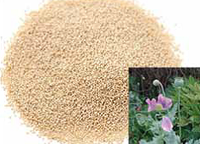
- English : Opium, Poppy Seeds
- Gujrati : Khaskhas
- Hindi : Apheem, Postadaanaa, Khaskhas, Khasabija
- Kannada : Gasgase, Aapheen, Aphini
- Malayalam : Avin, Karappu, Kashkash, Aalan
- Marathi : Khaskhas
- Oriya : Aapu
- Tamil : Kasakash, Posttakkaai, Avinee
- Telugu : Gasgashaalu, Nallamandu
- Urdu : Apheem
Medicinal Uses
- Quicker chemotherapy recovery: 5 gms of Poppy seeds and 5 badam soaked in 100ml of milk. Deskinned badam and blended together in a mixer. Drink this milk once a day is an excellent remedy for all cancer patients undergoing chemotherapy and suffering from burning sensation from tongue to intestines.
- Mouth ulcers : 5-10 grams of khas khas seeds are soaked in 100ml of water. This is made into fine paste and applied to the lesions of mouth ulcers.
- General weakness: 10-15 gram of khas khas seeds added to 100ml of milk. This is macerated or churned well. According to the need sugar or jaggery can also be added. This gives instant energy and pacifies tiredness.
- Insomnia: Khas khas kheer prepared by cooking with coconut milk, sugar/jaggery and little amount of Rava/wheat pieces is very effective in cases like insomnia, head ache etc.
- Acne: 1 spoon of poppy seeds are soaked in curd and made into paste and applied over the scars, acne marks or over the dark circles. This helps to vanish all these lesions.
Krishna musali (Talamuli)
Scientific name :Curculigo orchioides
Family : Amaryllidaceae
Vernacular name
- Assamese : Talmuli, Tailmuli
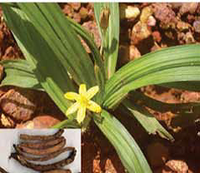
- Bengali : Talmalu, Tallur
- English : Golden Eye-Grass
- Gujrati : Kalirnusali
- Hindi : Syahmusali, Kalimusli
- Kannada : Neltal, Neltathigodde, Nelatale, Nelatelegadde
- Malayalam : Nilappenea
- Marathi : Kali musali, Bhuimaddi
- Oriya : Talamuli
- Punjabi : Syah musali, Musali safed,
- Tamil : Nilappanai
- Telugu : Nel tadigadda
- Urdu : Musali Siyah, Kali Musali
Medicinal Uses
- Dysuria: Administration of 5 grams of root powder of krishna musali with honey or jaggery twice a day is useful to treat leucorrhoea, burning micturition of urine and loss of libido.
- Loss of libido: Equal quantity of Musali root, Aswagandha root, Gokshura fruit, Kapikacchu seed, Amalaki fruit are taken together. Take 5gms of this mixture in 100ml of milk and little jaggery added to cure sterility and loss of libido.
- Skin Allergy: External application of leaves paste of krishna musali over the effected area of skin is useful.
- Cough: Inhalation of the smoke from burnt krishna musli root is beneficial in chronic cough, cold and asthma.
- Hyper pigmentaion: External application of the paste of krishna musli root with Goatʼs milk is useful to cure hyper pigmentaion.
- Jaundice: 5gms of krishna musli root powder is given with water twice daily for a week
- General tonic: The dried rhizome is a tonic, and provides immunity and protection against diseases. krishna musli powder 5 gms with milk daily is recommended to promote immunity.
Kulanjana (Rasna variety)
Scientific name :Alpinia galanga,
Family : Zingiberaceae
Vernacular name
- English : Greater galangal
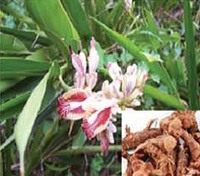
- Hindi : Kulanjan
- Kannada : Dhumarasmi
- Bengali : Kulingjan, Barakulanjan
- Gujarati : Kulinjan
- Malayalam : Arattha, Kolinji, Pararatta
- Tamil : Pera-rattai
- Kannada : Dhoomraasmi
- Telugu : Pedda-dhumpa, Dumpa rastramu
- Marathi : Kulinjan
Medicinal Uses
- Cough: A small piece of rhizome( 1-2 gram) of Kulanjana kept in the mouth and chewed slowly will certainly give a relieves from cough. It also releives nausea and vomiting sensation.
- Indigestion: For all sorts of digestive and respiratory ailments in infants and children, this rhizome of kulanjan is baked or heated and given 1 gm dose with honey and breast milk twice daily.
- Arthritis: 3 gram of kulanjana (rhizome) powder is administered thrice daily for rheumatic ailments.
- Fever: Powder prepared from equal quantity of kulanjana Licorice, and pippali should be administered 3gms with honey twice daily is highly beneficial in cough, headache, fever and indigestion.
- Joint pains: Paste of kulanjana leaves slightly heated in castor oil and applied externally over the inflamed joints, relieves the muscle spasm and pains.
- Hypothermia: Kulanjana powder is rubbed all over the body to increase the peripheral circulation in order to increase the body temperature.
Kuluttha
Scientific name :Dolichos biflorus
Family : Fabaceae
Vernacular name
- English : Horsegram, Cowpea
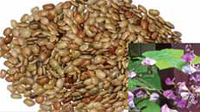
- Hindi : Kulathi
- Telugu : Ulavalu
- Kannada : Huruli
- Bengali : Kurtikalai,
- Malayalam : Muthiva,
- Muthera : Marathi: Kulith
- Gujarati : Kalathi, Kulit;
- Tamil : Kollu
- Unani : Kulthi
Medicinal Uses
- Renal calculi: Take 20gms of Unani : Kulthi kuluttha (horse gram) in 500ml of water and boil in pressure cooker about 5 to 7 whistles. Collect soup, add 2 teaspoon crushed pomegranate seeds and take once a day. This is especially useful in kidney and bladder stones.
- Amenorrhea: The horse gram seeds, induces menstrual periods. Hence people with prolonged menstrual cycle, scanty bleeding (oligomenorrhoea), are advised to use horse gram in their diet regularly. Decoction of seeds is also useful in the management of postpartum syndrome or to promote the discharge of lochia.
- Jaundice: Kanji (gruel) of horse gram seeds with jaggery is a remedy for jaundice.
- Obesity: Regular in take of horse gram soup daily once is beneficial in reducing obesity.
- Joint Pains: The paste of Kulattha seeds is used for fomentation to relieve localized swelling. The seeds stimulate and increase sweating, thus opening the sweat pores of the body to push out the toxins from the body.
- Intestinal worms: Decoction of horse gram seeds advised internally to relieve intestinal worms and also treat the piles by relieving the constipation.
Source: Ayurveda offering Herbal healing
Last Modified : 3/2/2020
